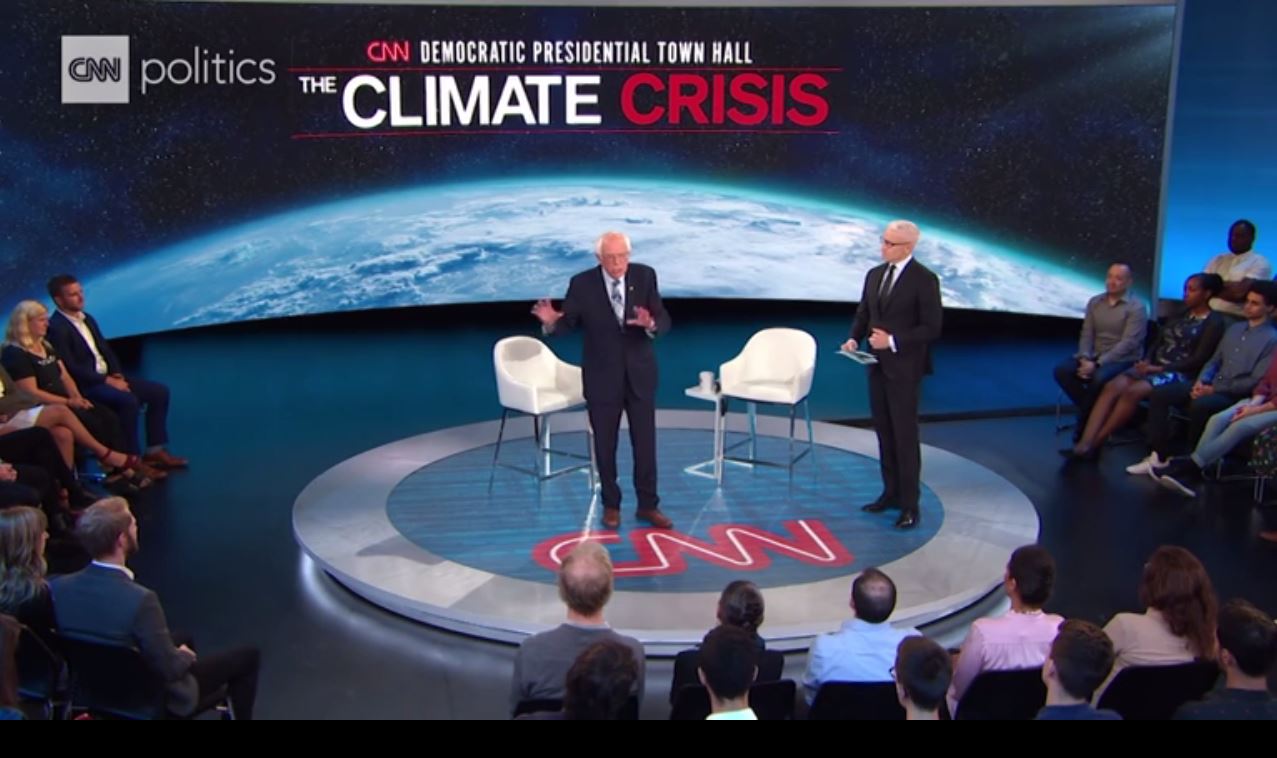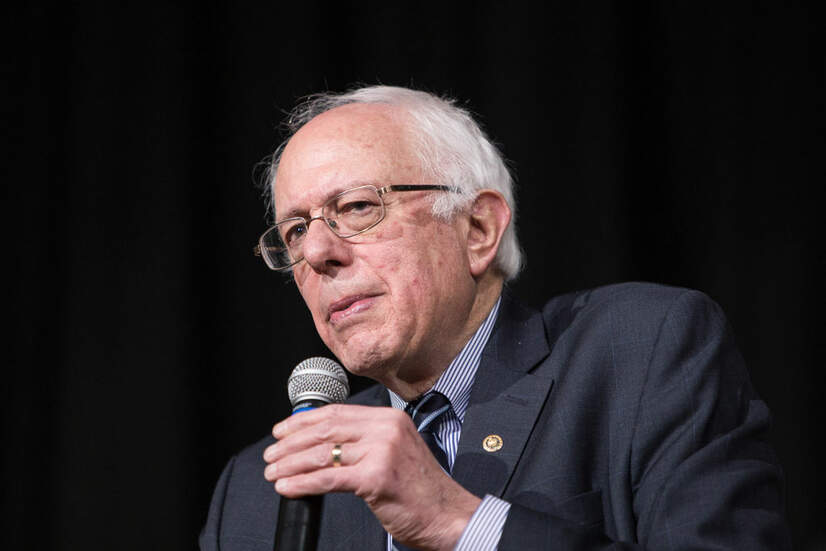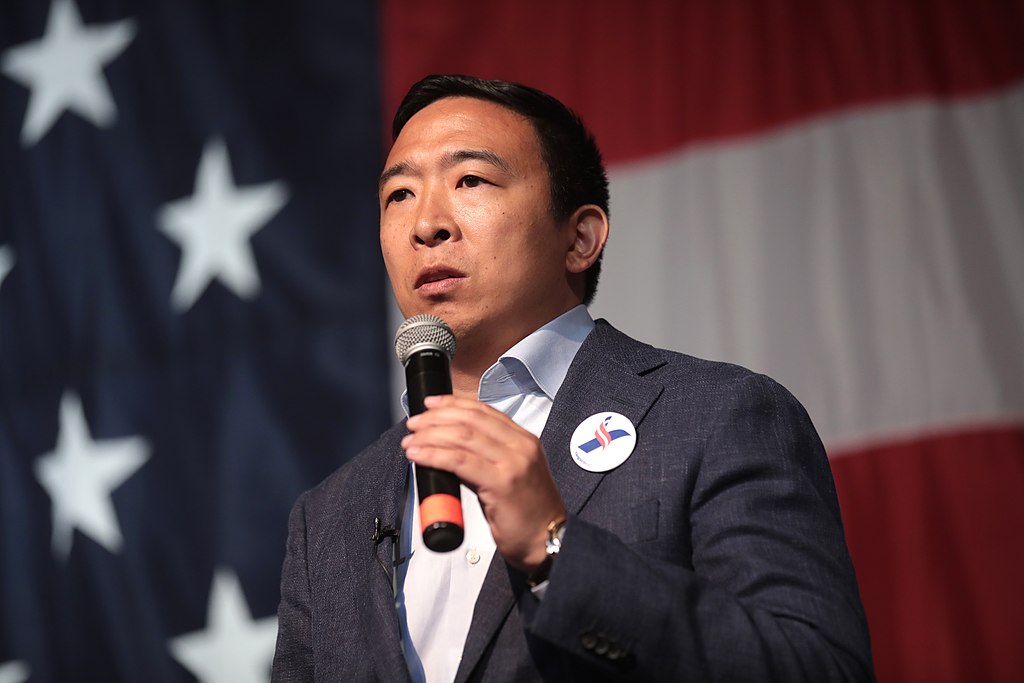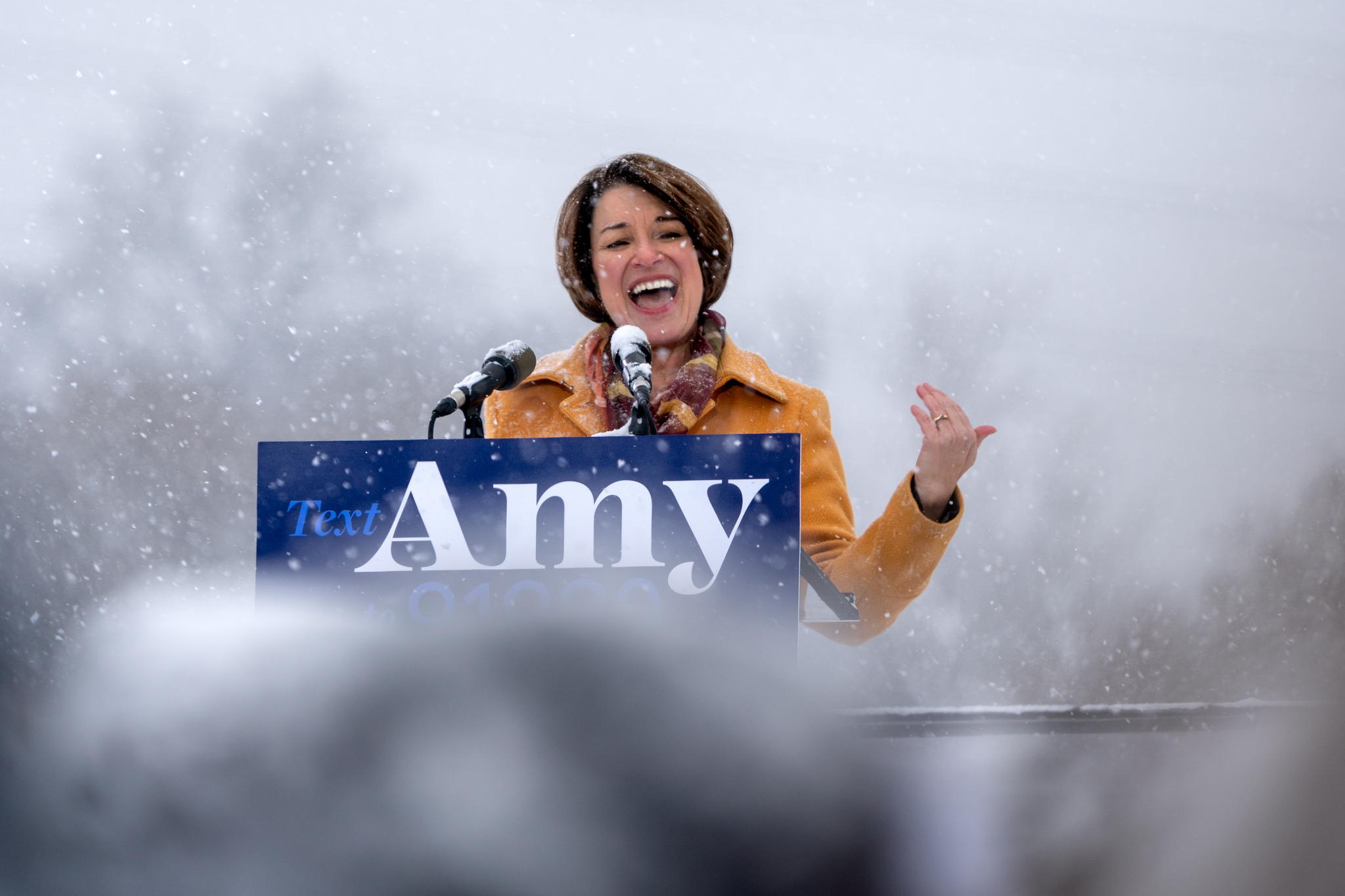CNN’s Wolf Blitzer kicked off a seven-hour long town hall on climate change with an unambiguous message of urgency on climate change.
“This unprecedented town hall is dedicated to the climate crisis,” he said, “an issue many voters say needs aggressive action and some scientists say that action needs to happen now.”
Many of the candidates offered multi-trillion dollar plans to address the crisis — as economists warn that the price of failing to act could be $69 trillion worldwide by the end of the century and U.S. firms forecast roughly $1 trillion in climate-related hits to their bottom lines over the next five years.
But the highlight of the evening wasn’t the economics nor was it the candidates. It was the questions — a mix of queries from CNN reporters, video-taped messages, and those attending the town hall in person. The questions were often nuanced and detailed — and drew on understandings shaped by both personal experience and professional expertise.
They rolled in from a wide array of Americans: from homeowners concerned that long-loved homes in floodplains face a future of repeat flooding and worried about whether insurance programs will offer support or make their decisions more difficult; from members of the Sunrise Movement, who’d successfully pushed for a broadcast town hall on climate and who confronted candidates directly on their track records; from doctors and nurses asking about how to protect communities from the worst impacts of climate change and — with memories of the government’s inadequate response to Hurricane Maria in Puerto Rico still so fresh — how politicians would ensure that communities of color would not be left out of those plans.
There were survivors of climate-linked disasters like the Camp fire that incinerated much of Paradise, California; folks hailing from the fracked gas fields of Pennsylvania; a restaurant worker and a retiree; environmental lawyers; multiple Columbia University students; and Chantel Comardelle, executive secretary of the Isle de Jean Charles Biloxi-Chitimacha-Choctaw Tribe in Louisiana, which is not only contending with the long legacy of Indian Removal Act policies but also rising seas.
Lots could be critiqued tonight
But it still feels remarkable to see 7 hours of largely substantive talk on CNN where science is taken as a given and candidates face good questions about solutions
A year ago I wouldn’t have believed it; makes me wonder where we’ll be in a year
— Justin Worland (@JustinWorland) September 5, 2019
The event was interrupted only for commercials and hourly updates on Hurricane Dorian in the Atlantic and an ongoing wildfire that’s forced the evacuation of hundreds in Murrita, California. The reported death toll from Dorian in the Bahamas inched higher during the broadcast.
Fossil-Fueled Misinformation Campaigns
Multiple candidates directly addressed climate science denial, describing it as a deliberate misinformation campaign which has been particularly effective in Washington D.C.
“Donald Trump thinks that climate change is a hoax,” said Senator Bernie Sanders. “I think he is dangerously, dangerously wrong.”
U.S. Senator and Presidential candidate Bernie Sanders speaking to students in Des Moines, Iowa, on January 28, 2016. Credit: Phil Roeder, CC BY 2.0
“Congress right now is like a room full of doctors arguing over whether medication or surgery is the best approach,” said Mayor Pete Buttigieg, “and the other half are saying cancer doesn’t exist.”
Andrew Yang proposed ending subsidies for the fossil fuel industries, which he said left corporations with the funds to mislead people on climate science. “You know how they’ve been spending some of that money, their billions of dollars in profit?” he said. “On a misinformation campaign to the American people, and they’ve taken our legislature hostage. They have the fossil fuel lobbying industry that’s in the tens of millions a year.”
Apparently @andersoncooper #ClimateTownHall just cited my & @NaomiOreskes‘s peer-reviewed study showing how #ExxonKnew about the global warming dangers of its products decades ago, then turned around & orchestrated a massive disinformation campaign to mislead the public. THREAD. https://t.co/1aBgZno465
— Geoffrey Supran (@GeoffreySupran) September 5, 2019
CNN’s Anderson Cooper also cited work exposing Exxon’s and Shell’s knowledge of climate science, including a 2017 study by researchers Geoffrey Supran and Naomi Oreskes showing that Exxon’s internal approach to climate change and rising seas was very different from its communications to the public on the topic.
‘This Sinking Feeling’
CNN’s moderators asked each candidate about the biggest “personal sacrifice” they wanted from the American people to address climate change.
Andrew Yang offered one of the evening’s most thoughtful responses to the question.
“Right now, we feel all this pressure to have our micro-impacts be low. So, you carry a bottle, instead of getting bottled water. You get those really irritating straws, sometimes not of your own choice. You recycle. You compost. But then you have this sinking feeling in the back of your mind that your actions are not actually going to move the needle in the context of a $20 trillion economy,” he said. “And so what I would ask the American people is to think bigger about the changes we can make collectively, and that stop thinking that, if you take some personal action, it’s going to solve things, because the reality is, we need to bring the entire world together.”
Andrew Yang speaking with attendees at the 2019 Iowa Democratic Wing Ding at Surf Ballroom in Clear Lake, Iowa. Credit: Gage Skidmore, CC BY–SA 2.0
Not too long after Senator Kamala Harris dissembled about paper straws when discussing banning plastic ones, rival candidate Senator Elizabeth Warren pushed back hard against a climate change approach that focuses on consumer-level solutions while ignoring or downplaying structural problems. Asked about the Trump administration’s move to relax rules on light bulb efficiency, which was made the day of the debate, Warren sighed in apparent exasperation.
It just hit me: The burger obsession comes from Fox News coverage of the Green New Deal, aka “they’re coming after your favorite things” Polling has shown it’s done some damage to climate messaging: https://t.co/KhyU8bfBWy pic.twitter.com/gPGFn1NUMt
— Rebecca Leber (@rebleber) September 5, 2019
“That’s what they want us to talk about,” she said, referring to fossil fuel companies. “They want to be able to stir up a lot of controversy around your light bulbs, around your straws, and around your cheeseburgers, when 70 percent of the pollution, of the carbon that we’re throwing into the air, comes from three industries.”
Natural Gas ‘Bridge Fuel’ on Fire
The claim that natural gas can be a “bridge fuel,” which was a cornerstone of the Obama administration’s approach to fossil fuels, was largely abandoned by the candidates, with most indicating some level of support for bans on fracking and offshore drilling.
Julian Castro, who acknowledged that he had welcomed fracking when he served as mayor of San Antonio, Texas, said that while a decade ago he’d thought that natural gas could be a bridge fuel, “we’re coming to the end of the bridge,” adding later that he might approach the issue differently today.
While problems linked to fracking certainly run deeper than just climate change, Castro’s tenure as mayor in San Antonio began in 2009 and it wasn’t until 2011 that climate scientists first warned that methane leaks made natural gas potentially the most climate-damaging fossil fuel rather than the least. That science, however, was significantly better established by the time Castro left the mayor’s office.
Senator Amy Klobuchar made her announcement to run for president in 2020 on a snowy Sunday in Minneapolis, Minnesota. Credit: Lorie Shaull, CC BY–SA 2.0
The furthest outlier on methane was Minnesota Senator Amy Klobuchar, who said she still sees natural gas as a “transition fuel” and said she’d allow fracking to continue, despite saying that the crisis requires us to “do what the science tells us.” Klobuchar added that she’d review fracked oil and gas wells individually to decide which ones are “too dangerous.” For reference, drillers have fracked more than 1.7 million wells in the U.S., according to the Independent Petroleum Association of America.
Wow, big, Klobuchar calls natural gas “a transition fuel. It’s better than oil and not nearly as good as wind and solar”
Gas means methane leaks, increasing the potency of ghgs during the decades we can’t afford it. That’s a bigger embrace of fracking than Clinton in 2016
— Rebecca Leber (@rebleber) September 4, 2019
Biden Seeks Fine Print on Fossil Pledge
Joe Biden also rejected a nationwide ban on fracking — but that wasn’t the most controversial portion of the evening for Biden. He faced repeated questions on his credibility on climate.
“Older generations have continued to fail our generation by repeatedly choosing money and power over our lives and our futures,” said 19 year-old Katie Eder, youth activist and executive director of the Future Coalition. “So how can we trust you to put us, the future, over the wants of large corporations and wealthy individuals?”
“Everything I’ve done has been done to take on the polluters and take on those who are decimating the environment,” Biden replied. “It’s been my entire career.”
Biden also faced a direct question from the audience about his post-town hall plans: attending what the Intercept, which broke the story, called “a high-dollar fundraiser co-hosted by a founder of a fossil fuel company.” Biden disputed the notion that this might violate the fine print in his pledge to reject money from the fossil fuel industry, citing the fact that the event host wasn’t listed as an executive in SEC filings by the Houston-based liquefied natural gas (LNG) exporter he’d founded.
Joe Biden says he’s finding out live in CNN what everyone else read in this article. https://t.co/2E4tm1p65R
— Briahna Joy Gray (@briebriejoy) September 5, 2019
That drew sharp pushback from Oil Change US, which helped to craft the pledge that Biden and other candidates signed. “We defined the rules of the pledge with the intent of making it easier for candidates to live up to it, not to provide loopholes for candidates to exploit in order to keep raising funding from fossil fuel related sources,” spokesperson David Turnbull told The New York Times after the town hall ended.
Biden summed up the overall approach he’d take to the climate crisis in just one sentence, which he repeated twice. “Everything is incremental.”
“There are things that we can do now — now — that can begin to change the arc in a significant way,” he said.
You don’t need to sit through the Dems’ 7-hour (!) climate town hall to know their “plan.”
Here’s the Spark Notes version:
—Raise taxes & kill American jobs—
Meanwhile, President Trump is creating jobs AND supporting the environment by embracing innovation over regulation.
— GOP (@GOP) September 4, 2019
It’s worth noting that there appears to be little time for an incremental approach, in the view not only of other Democratic candidates, but of the world’s foremost climate science experts.
The United Nations — which through the Intergovernmental Panel on Climate Change (IPCC) has taken point on developing consensus climate science in a process that has included fossil fuel representatives as well as climate experts — warned in March that the world has “only 11 years left to prevent irreversible damage from climate change.”
Coal Miners, Rig Workers
Many of the candidates connected a response to climate change with the chance to offer Americans good-paying jobs in non-fossil fuel industries.
“I want to be very clear that the coal miners, the men and women who work on the oil rig, they are not my enemy,” said Sanders. “Climate change is my enemy.”
The conversation delved deeply into the difficulties facing older workers in fossil industries, with candidates saying that they didn’t expect everyone to go out and become a solar installer. Candidates talked about jobs not only in the renewable energy industry, but in all of the trades, as well as a revamped approach to farming and agriculture.
Former Representative Beto O’Rourke suggested that pushing for climate solutions can transcend political party, saying that his visits to each county in Texas left him convinced that there was broader support for action than he’d expected. “So, I found that this is more of a popular issue across party lines than I would have imagined before,” he said.
“Climate is not a separate issue,” added Senator Cory Booker as the marathon evening ended. “It is the lens through which we must do everything.”
Main image: CNN Climate Town Hall screenshot.Subscribe to our newsletter
Stay up to date with DeSmog news and alerts










